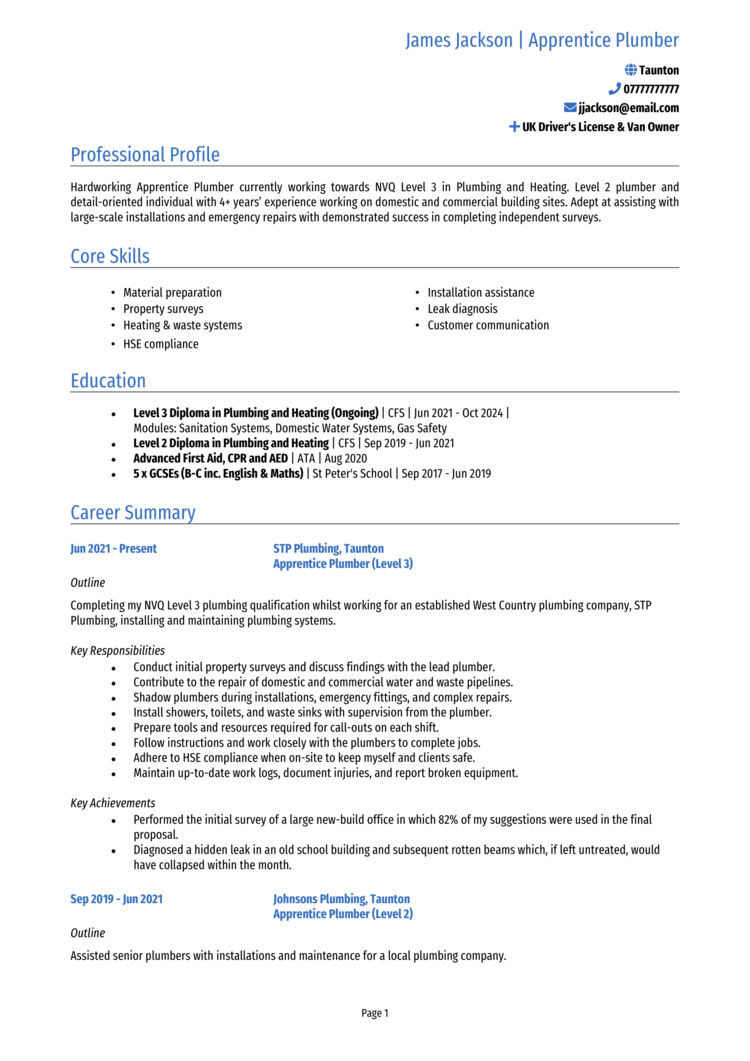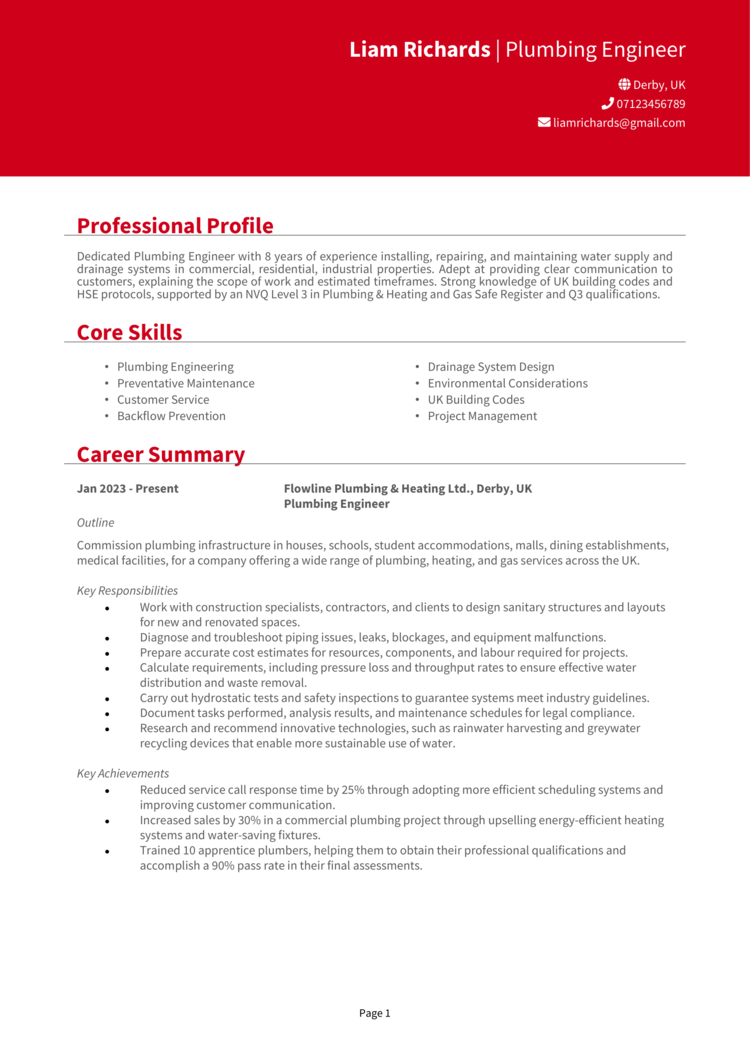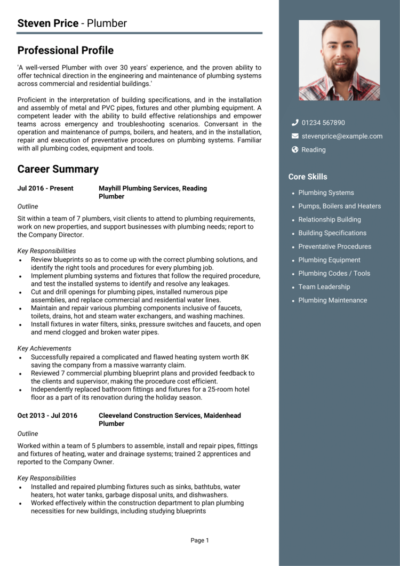If you’ve ever saved the day by fixing a burst pipe before it turned into a swimming pool, you know plumbing isn’t just a job – it’s a superpower. Now let’s channel that hero energy into your CV. As a plumber, your expertise keeps the world flowing – literally.
But before you can install, repair, or unclog anything, you’ll need to land the job first. With these Plumber CV examples and simple step-by-step guide, you’ll be well-equipped for writing a CV that gets noticed and ensures you consistent and rewarding work.
Plumber CV example

Apprentice Plumber CV example

Plumbing Engineer CV example

How to write your Plumber CV
Learn how to create your own interview-winning Plumber CV with this simple step-by-step guide.
A good CV for a plumber will demonstrate to recruiters your technical skills, experience, and ability to solve complex problems under pressure.
By the end of this article, you’ll know how to best highlight your qualifications and showcase your expertise. Your new CV will get you hired for plumbing jobs that keep you busy (and well-paid).
Plumber CV structure


Your CV should be as well-organised as your toolbox, making it easy for hiring managers to find the details that prove you’re the right fit. Making your CV structure confusing and hard to navigate will only frustrate recruiters, who’ll swiftly move onto the next candidate in the pile.
A Plumber CV should be structured as follows:
- Name and contact details – Contact details sit right at the top so employers can reach you quickly. Including a picture of yourself is rarely required.
- Profile – Kick off with a brief summary of your plumbing expertise, experience, and career highlights.
- Core skills – Use bullet points to concisely highlight the key abilities, from pipe fitting to troubleshooting leaks.
- Work experience – Share your professional history in reverse chronological order.
- Education – Make sure you mention your academic awards, apprenticeships, and certifications.
- Additional info – You can optionally list any relevant hobbies and interests which help to convey your problem-solving skills.
Plumber CV format


Your CV format and overall presentation should be as clean as the finished job after a leak-free install. A tidy, professional layout ensures employers focus on your skills, not your formatting mistakes.
Here’s how to format your Plumber CV effectively:
- Bullet points – Break down your experience and achievements into quick, scannable chunks.
- Divide sections – Make use of distinct headings and logical spacing to guide recruiters through your CV.
- Use a clean font – Choose a straightforward font that’s as clear as your communication on the job.
- Keep it the right length – Aim for no more than 2 pages. This gives you the length you need to detail your experience while keeping it concise enough to respect the recruiter’s time.
Creating your Plumber CV profile


Your profile (or personal statement for newer candidates) is your chance to introduce yourself and prove why you’re the plumber every company wants to hire. It’ll need to convince the recruiter of the benefits they’d get by hiring you for the job.
Plumber CV profile examples
Profile 1
Skilled Plumber with five years of experience in residential plumbing, specialising in installations, repairs, and maintenance. Proficient in diagnosing and resolving issues with water heaters, pipes, and drainage systems. Delivered reliable solutions that reduced water usage and minimised costs for clients.
Profile 2
Organised Plumber with three years of experience working on commercial and industrial projects, including large-scale pipe installations and maintenance. Skilled in reading blueprints, adhering to safety regulations, and ensuring project completion within deadlines.
Profile 3
Experienced Plumber with over eight years of expertise in renewable energy systems, specialising in solar water heating and energy-efficient plumbing solutions. Adept at managing multi-site projects and collaborating with contractors to ensure compliance with environmental standards.
What to include in your Plumber CV profile
Here are some tips on what to include in your Plumber CV profile:
- Where you’ve worked – Mention industries or types of work, like domestic repairs or large-scale commercial projects.
- Your top qualifications – List off your NVQs, plumbing certifications, or licenses.
- Specialised skills – Tell the recruiter your areas of expertise, such as boiler installation or pipe welding – tailor these toward the job you’re applying for.
- Customer experience – Show your ability to work with clients and deliver excellent service.
- Key tools and systems – Reference your familiarity with specific tools or systems, like gas safety equipment or drainage solutions.
Core skills section


Your core CV skills section is your CV’s “quick fixes” – showcasing your abilities in a way that’s instantly clear to employers. Tailor this section to the specific job you’re applying for, focusing on the tools and techniques that match the role.
Key skills that make a Plumber CV stand out
- Pipe Installation – Installing and connecting pipes for water, gas, and drainage systems in residential and commercial properties.
- Leak Detection and Repair – Identifying and fixing leaks using specialised tools and techniques to prevent water damage.
- Fixture Installation – Installing sinks, faucets, toilets, showers, and other plumbing fixtures with precision.
- Drain Cleaning – Unblocking and maintaining drainage systems using tools like augers and hydro-jetting equipment.
- System Maintenance – Performing routine inspections and maintenance to ensure plumbing systems function efficiently.
- Water Heater Servicing – Installing, repairing, and maintaining water heaters, including tankless and traditional models.
- Blueprint Interpretation – Reading and following building blueprints to plan and execute plumbing layouts.
- Welding and Soldering – Joining pipes securely using welding and soldering techniques for long-lasting connections.
- Pressure Testing – Assessing system pressure to identify potential issues and ensure compliance with regulations.
- Code Compliance – Ensuring all plumbing work adheres to local building codes and safety standards.
Outlining your work experience


Your work experience section is where you prove you’ve got the practical know-how to handle any plumbing challenge. Qualifications are valuable, but recruiters would always prefer someone who can prove they know what to do: so flesh out your most relevant and recent work experience.
List your job history with the most recent ones toward the top of your CV.
How to structure jobs

- Outline – Describe the company or client, the type of work you did, and the scale of the projects.
- Responsibilities – Highlight key tasks, such as diagnosing issues, installing systems, or performing routine maintenance.
- Achievements – Include measurable outcomes, like reducing water waste, completing projects ahead of schedule, or achieving excellent client feedback. Make use of numbers wherever possible to emphasise your impact.
Work experience samples for a Plumber
Plumber | RapidFlow Services
Outline
Provided plumbing services for a residential plumbing company, focusing on repairs, installations, and emergency callouts. Ensured quality workmanship and customer satisfaction.
Responsibilities
- Installed and repaired pipes, fixtures, and water heating systems in homes.
- Diagnosed plumbing issues and provided cost-effective solutions.
- Conducted routine maintenance to prevent leaks and improve system efficiency.
- Adhered to safety and building regulations during all installations and repairs.
- Maintained detailed service records and provided customers with usage tips.
Achievements
- Reduced client water bills by 20 percent through efficient system upgrades.
- Completed 95 percent of projects on schedule with minimal disruptions.
- Praised by customers for professionalism and high-quality workmanship.
Plumber | Profix Commercial Plumbing
Outline
Worked on plumbing installations and maintenance for a construction firm specialising in commercial properties. Focused on large-scale systems and delivering projects on time and within budget.
Responsibilities
- Installed and maintained complex plumbing systems, including boilers and waste management systems.
- Read and interpreted blueprints to execute precise pipe layouts.
- Collaborated with contractors to ensure seamless integration of plumbing systems into buildings.
- Conducted pressure tests and inspections to ensure compliance with safety standards.
- Managed inventory and ordered materials to keep projects on schedule.
Achievements
- Completed a £500K commercial plumbing project two weeks ahead of schedule.
- Reduced system failures by 30 percent through rigorous testing and maintenance.
- Recognised by management for excellent project coordination and attention to detail.
Plumber | ExoFlow Energy Solutions
Outline
Specialised in renewable energy plumbing systems for a company focused on sustainability. Installed and maintained solar water heating systems and energy-efficient plumbing solutions for residential and commercial clients.
Responsibilities
- Designed and installed solar water heating systems to improve energy efficiency.
- Upgraded plumbing fixtures to reduce water usage and environmental impact.
- Educated clients on maintaining sustainable plumbing solutions.
- Collaborated with environmental engineers to ensure compliance with green building standards.
- Provided maintenance services to optimise system performance over time.
Achievements
- Reduced water usage by 25 percent for a multi-site commercial client.
- Completed over 50 solar water heating installations with a 100 percent satisfaction rate.
- Awarded Green Plumbing Professional of the Year for contributions to sustainability.
What should your CV’s education section include?


The education section highlights your technical training and qualifications in plumbing.
Include your apprenticeships, certifications, and any specialised training. For example, courses in gas safety or drainage systems can set you apart.
Always list qualifications in reverse chronological order, starting with the most recent.
Best qualifications for Plumbers
- Level 2 NVQ Diploma in Plumbing and Heating – Covers installation, maintenance, and repair of plumbing systems.
- Gas Safe Registration – Certifies you to work safely with gas appliances and systems.
- Water Regulations Advisory Scheme (WRAS) Certification – Validates knowledge of UK water regulations.
- City & Guilds Plumbing Courses – Provides comprehensive training in plumbing techniques and standards.
- Unvented Hot Water Systems Certification – Demonstrates expertise in installing and maintaining unvented water heaters.





